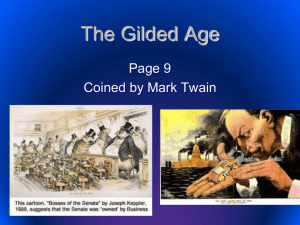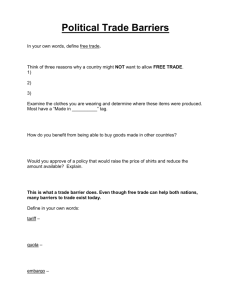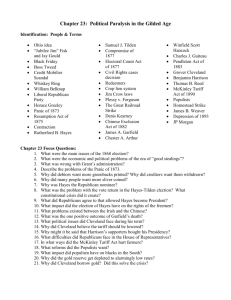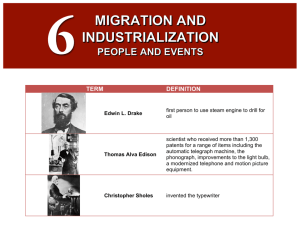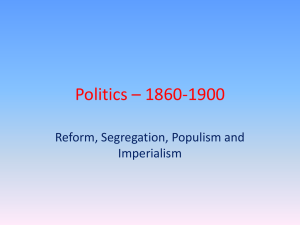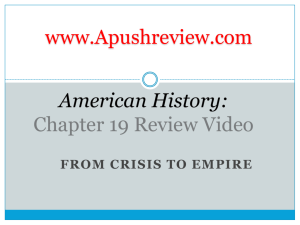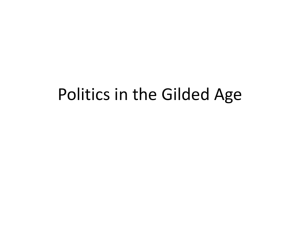GildedAgePolitics upload
advertisement
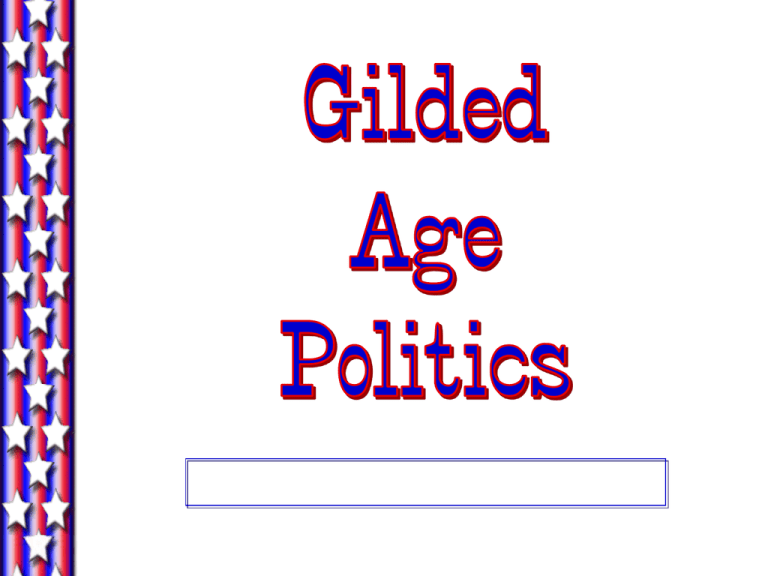
Machine Politics SECTION 3: POLITICS IN THE GILDED AGE • As cities grew in the late 19th century, so did political machines • Political machines controlled the activities of a political party in a city • Ward bosses, precinct captains, and the city boss worked to ensure their candidate was elected ROLE OF THE POLITICAL BOSS • The “Boss” (typically the mayor) controlled jobs, business licenses, and influenced the court system • Precinct captains and ward bosses were often 1st or 2nd generation immigrants so they helped immigrants with naturalization, jobs, and housing in exchange for votes Boss Tweed ran NYC MUNICIPAL GRAFT AND SCANDAL • Some political bosses were corrupt • Some political machines used fake names and voted multiple times to ensure victory (“Vote early and often”) – called Election fraud • Graft (bribes) was common among political bosses • Construction contracts often resulted in “kickbacks” • The fact that police forces were hired by the boss prevented close scrutiny THE TWEED RING SCANDAL • William M. Tweed, known as Boss Tweed, became head of Tammany Hall, NYC’s powerful Democratic political machines • Between 1869-1871, Tweed led the Tweed Ring, a group of corrupt politicians, in defrauding the city • Tweed was indicted on 120 counts of fraud and extortion • Tweed was sentenced to 12 years in jail – released after one, arrested again, and escaped to Spain Boss Tweed Political Machines & Social Welfare • No social “safety net” existed – No welfare, no food stamps, no workers’ compensation, no unemployment insurance, no employment agencies • Political machines filled a real need – – – – – Christmas turkey basket Patronage Social network Career ladder Ease transition of immigrants into American life (see The Reckless Decade, pg 105-6) – Plunkitt of Tammany Hall – Ch 23 Handout An Era of Stalemate • “forgettable” presidents – No two consecutive terms for anyone • Politicians who largely ignored problems arising from the growth of industries & cities • Two major parties avoided taking stands on controversial issues An Era of Stalemate • Why? • Belief in limited government – Laissez-faire economics – Social Darwinism – Federal courts narrowly interpreted the government’s powers to regulate business An Era of Stalemate • Why? • Campaign strategy – Close elections between 1876-1896 – Divided government in Washington • One party controls presidency; the other party controls one or both houses of Congress – See handout – Objective was to get out the vote and not alienate voters on the issues • Issue-free campaigns An Era of Stalemate • Why? • Party Patronage – Politics was chiefly a game of gaining office, holding office, and providing government jobs to the party faithful – Who got the patronage jobs within the party was the most important issue • Led to President Garfield’s assassination 1. A Two-Party Stalemate Pallid Politics In The Gilded Age • Balance of two political parties during the Gilded Age from 1869-99. • Majority in Congress flipped back and forth six times in the 11 terms between 1869-91 • Few controversial stands • Few dramatic policy differences between parties. • Voter turnout /voter loyalty. • Political machines and patronage The 3rd Party System: Republicans Rout Democrats in Presidential Elections Republican Dominance: President Party Years Rep Home State Ohio Hayes Garfield Rep Ohio 1881 Arthur Rep New York 1881-1884 Cleveland Dem New York 1884-1888 Harrison Rep Indiana 1888-1892 Cleveland Dem New York 1892-1896 McKinley Rep Ohio 1896-1900 1876-1880 2. Intense Voter Loyalty to the Two Major Political Parties 3. Well-Defined Voting Blocs Democratic Bloc White southerners (preservation of white supremacy) Catholics Recent immigrants (esp. Jews) Urban working poor (pro-labor) Most farmers Republican Bloc Northern whites (pro-business) African Americans Northern Protestants Old WASPs (support for anti-immigrant laws) Most of the middle class Republicans v. Democrats • Republicans: – Embodied the old Puritanical ideals. – Strict moral codes and belief that government should be an instrument in regulating economic and moral affairs of the community. – Strong in Midwest and in rural and small-town New England. – Got most of votes from Freedman and from Union Civil War Vets. Republicans v. Democrats • Democrats – More Roman Catholic and Lutheran. – South and northern industrial cities – Large immigrant base and strong Dem. machines. – Supported states’ rights and limited powers for the federal government Republicans Democrats Where Who Midwest, rural “native” Americans, Union Northeast veterans, African-Americans South, Immigrants, white south Northeastern cities Gilded Age Political Campaigns • Brass bands, parades, flags, campaign buttons, picnics, free beer, and crowdpleasing oratory II. Why Republicans Win A. Waving the Bloody Shirt: The Grand Army of the Republic and Voting as you Shot • Dems caused CW & murdered Lincoln B. Rewarding Your Supporters: Patronage and the Spoils System C. Warning of the Immigrant Menace: Ethnicity, Religion, and Nativism 4. Very Laissez Faire Federal Govt. From 1870-1900 Govt. did very little domestically. Main duties of the federal govt.: Deliver the mail. Maintain a national military. Collect taxes & tariffs. Conduct a foreign policy. Exception administer the annual Civil War veterans’ pension. 5. The Presidency as a Symbolic Office Party bosses ruled. Presidents should avoid offending any factions within their own party. The President just doled out federal jobs. Senator Roscoe Conkling 1865 53,000 people worked for the federal govt. 1890 166,000 “ “ “ “ “ “ The Political System • Weak presidents – President’s job was to administer, not lead • Inefficient Congress – Most important branch, but – Noisy and chaotic; little effective action • Only 5 major bills through Congress from 1875-1896 • Federal Bureaucracy – Small & limited – 1870: 50k federal employees • ¾ were postmasters throughout the country • Only 6k in Washington, D.C. Major issues of the day • Civil Service reform – Pendleton Act of 1881 set up Civil Service Commission • Competitive exams for certain jobs • Business & financial regulation – Interstate Commerce Act – Sherman Antitrust Act • Tariffs The Tariff Issue After the Civil War, Congress raised tariffs to protect new US industries. Big business wanted to continue this; consumers did not. 1885 tariffs earned the US $100 mil. in surplus! Tariffs became a major issue in the 1888 presidential election. Arguments in the Tariff Debates Area Affected High Tariffs (Big Business) Low Tariff (farmers, labor, small business) Industry Promote industrial growth Inflates corporate profits Employment Stimulates job growth Restricts competition Wages & Prices Permit higher wages Increases consumer prices Government Provide government revenue Violates laissez-faire & produces revenue that tempts gov’t to activism Trade Protects the domestic market Restricts foreign trade because other countries retaliate; hurt farmers who couldn’t sell surplus Major issues of the day • The “Money Question” • Whether or not to expand the money supply (create inflation) – Reflected the tension between the “haves” and “have-nots” – Debtors, farmers, and start-up businesses wanted more $ in circulation • Could borrow @ lower interest rates • Could pay off loans more easily with inflated $ Major issues of the day • The “Money Question” • Inflate the currency by printing paper money (greenbacks) or minting more silver coins (“free silver”) • The other side: bankers, creditors, investors, and established businesses stood firm for hard money – currency backed by gold stored in government vaults (“sound money”) – $ backed by gold would more likely hold its value against inflation • The issue boiled down to: The Gold Standard vs. Bi-metallism SILVER OR GOLD? • The central issue of the 1896 Presidential campaign was which metal would be the basis of the nation’s monetary system • Bimetallism (those who favored using both) vs. those that favored the Gold Standard alone 1881: Garfield Assassinated! Charles Guiteau: I Am a Stalwart, and Arthur is President now! CHESTER ARTHUR TAKES COMMAND • Not many expected much from Arthur. Why? • Displayed surprising integrity, intelligence and independence. • Arthur threw his support behind reform of spoils system. • Pendleton Act of 1883 – Details – Unintended consequences? CIVIL SERVICE REPLACES PATRONAGE Applicants for federal jobs are required to take a Civil Service Exam • Nationally, some politicians pushed for reform in the hiring system • The system had been based on Patronage; giving jobs and favors to those who helped a candidate get elected • Reformers pushed for an adoption of a merit system of hiring the most qualified for jobs • The Pendleton Civil Service Act of 1883 authorized a bipartisan commission to make appointments for federal jobs based on performance Pendleton Act (1883) Civil Service Act. The “Magna Carta” of civil service reform. 1883 14,000 out of 117,000 federal govt. jobs became civil service exam positions. 1900 100,000 out of 200,000 civil service federal govt. jobs. A Dirty Campaign Ma, Ma…where’s my pa? He’s going to the White House, ha… ha… ha…! Rum, Romanism & Rebellion! Led a delegation of ministers to Blaine in NYC. Reference to the Democratic Party. Blaine was slow to repudiate the remark. Dr. Samuel Burchard Narrow victory for Cleveland [he wins NY by only 1149 votes!]. Cleveland’s First Term The “Veto Governor” from New York. First Democratic elected since 1856. A public office is a public trust! His laissez-faire presidency: Opposed bills to assist the poor as well as the rich. Vetoed over 200 special pension bills for Civil War veterans! Cleveland and History • Cleveland the first sitting president to be voted out of office since Van Buren in 1840. (Others: J. Adams, J.Q. Adams, Harrison, Hoover, Carter, Bush) • Cleveland last to win popular vote and lose electoral college until Gore. • Cleveland only president to have two non-consecutive terms. 1888 Presidential Election Political Gravy For All • • • • Billion Dollar Congress Pension Act of 1890 Sherman Anti-Trust Act Tariffs and Silver – Easterners wanted a higher tariff – Westerners and farmers wanted more silver minted Changing Public Opinion Americans wanted the federal govt. to deal with growing soc. & eco. problems & to curb the power of the trusts: Interstate Commerce Act – 1887 Sherman Antitrust Act – 1890 McKinley Tariff – 1890 Based on the theory that prosperity flowed directly from protectionism. Increased already high rates another 4%! Rep. Party suffered big losses in 1890 (even McKinley lost his House seat!). III. What Do Republicans Do Once in Office? 1. Support Higher Tariffs -- Ex. McKinley tariff = ~48% Tariff Ire • Sherman Silver Purchase Act of 1890 • McKinley Tariff Bill – raised tariff rates to their highest peacetime level—48% • Farmers hated the new tariff. Why? • Republicans punished in 1890 congressional election. – Lose nearly 60 seats and Dems have a huge majority in Congress OLD GROVER CLEVELAND AGAIN • Depression of 1893 • Causes: – – – – Over-building and over-speculation labor unrest agricultural depression from low commodity prices reduction of US credit abroad because of Silver Purchase Act – Problems with overseas banks, which were forced to call in US loans. • Cleveland does next to nothing— laissez faire
